Tech
Tested: AMD Ryzen AI 300 brings serious performance to Copilot+ PCs

What makes the PC the superior platform for personal computing? The diversity of choices between brands of laptops and brands of CPUs.
Sometimes that choice can be daunting though. Qualcomm’s new Snapdragon X Elite just launched in Microsoft’s debut Copilot_ laptops, coming out swinging against Intel’s Core Ultra chip. With the launch of Ryzen AI 300-series today, you’re now faced with a third choice.
Fear not, as I’ve just finished testing performance testing of AMD’s Ryzen AI 9 HX 370, its new flagship processor for Copilot+ laptops. Here’s how it stacks up against Intel and Qualcomm across a wide range of benchmarks. Spoiler alert: AMD’s new chip is pretty, pretty, pretty darn good.
AMD Ryzen AI 9 HX 370 multi-core performance
Qualcomm’s Snapdragon X Elite offers impressive multi-core performance but the brass-ring for this round goes to AMD’s new Ryzen 300 AI series. You can see the results below where AMD’s Ryzen AI 9 HX 370 outpaces the Snapdragon X Elite X1E-80-100 and definitely dusts off Intel’s Core Ultra 7 155H.
Intel fans may cry foul because the Core Ultra 9 185H offers better multi-core performance than the chips we had available to test. That’s true and I’ll note that Notebookcheck.com recorded a Core Ultra 9 185H with a score of 947 but that’s still behind the performance of the Ryzen AI 9 HX 370. AMD is likely to also point out that the Core Ultra 9 185H is a 45 watt TDP chip versus the Ryzen AI 9’s 17 watt to 28 watt configuration.
The Ryzen AI 9 HX 370’s 12-cores combines four Zen 5 cores with eight Zen 5c cores giving impressive multi-core performance.
Gordon Mah Ung
I’ll leave the arguing to Reddit, but what impresses me more about the Ryzen AI 9 HX 370 is that it’s able to slightly outpace the performance of the Core i9-13900H and the Ryzen 9 7940HS. The “Raptor Lake” Core i9-13900H is a 45 watt TDP chip and the “Phoenix” Ryzen 9 7940HS is a 35 watt to 54 watt chip. Both are riding inside of thicker, heavier, and powerful content creation laptops which typically can keep their CPUs cooler and supply more power to them as well.
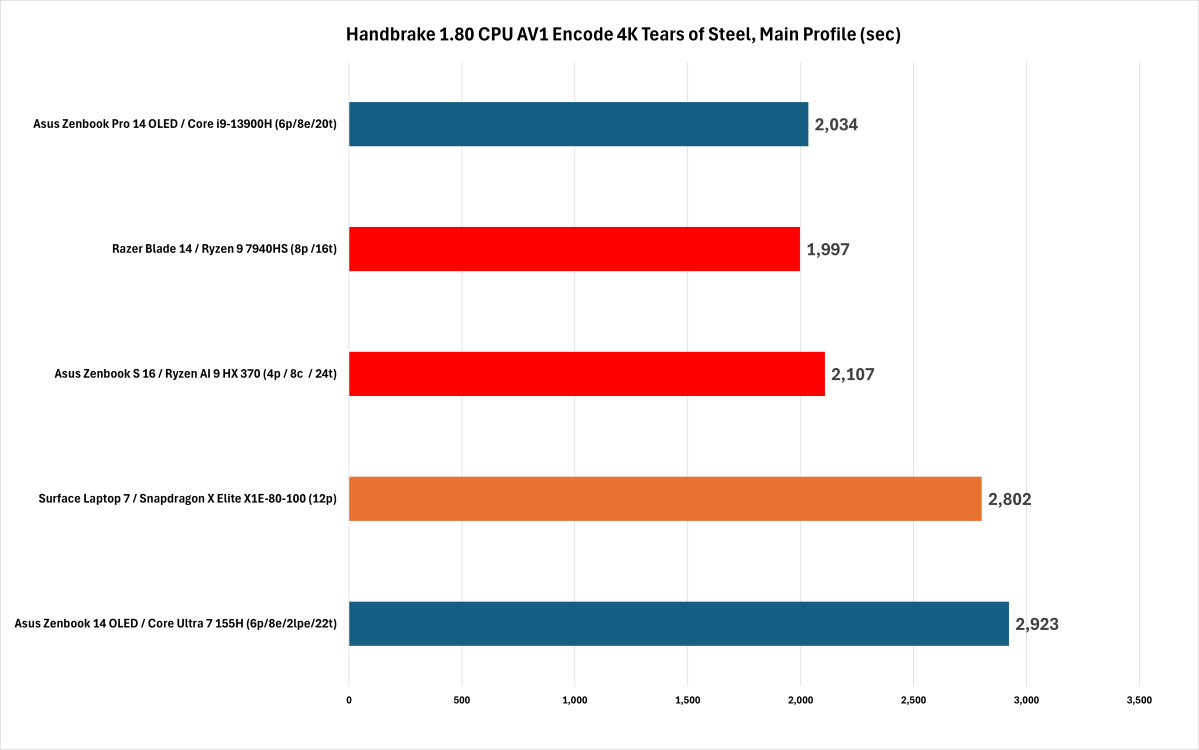
Ryzen AI 9 HX 370 easily outruns the Snapdragon X Elite and Core Ultra 7 in Handbrake 1.8.0
Gordon Mah Ung
It’s not just Cinebench 2024 either. You can also how well the Ryzen AI 9 HX 370 performs quite well running a Handbrake video encode which we run using the CPU cores. You can see the Ryzen AI 9 HX 370 hangs with the more powerful content creation laptops as well leaving both the Snapdragon X Elite and Core Ultra 7 behind.
Further reading: The best laptops we’ve tested
AMD Ryzen AI 9 HX 370 single-core performance
Multi-core performance is a sexy marketing feature for CPU vendors but in thin and light laptops, the vast majority of the time single-threaded performance is what matters. Cinebench 2024 has a single-threaded mode which you can see below.
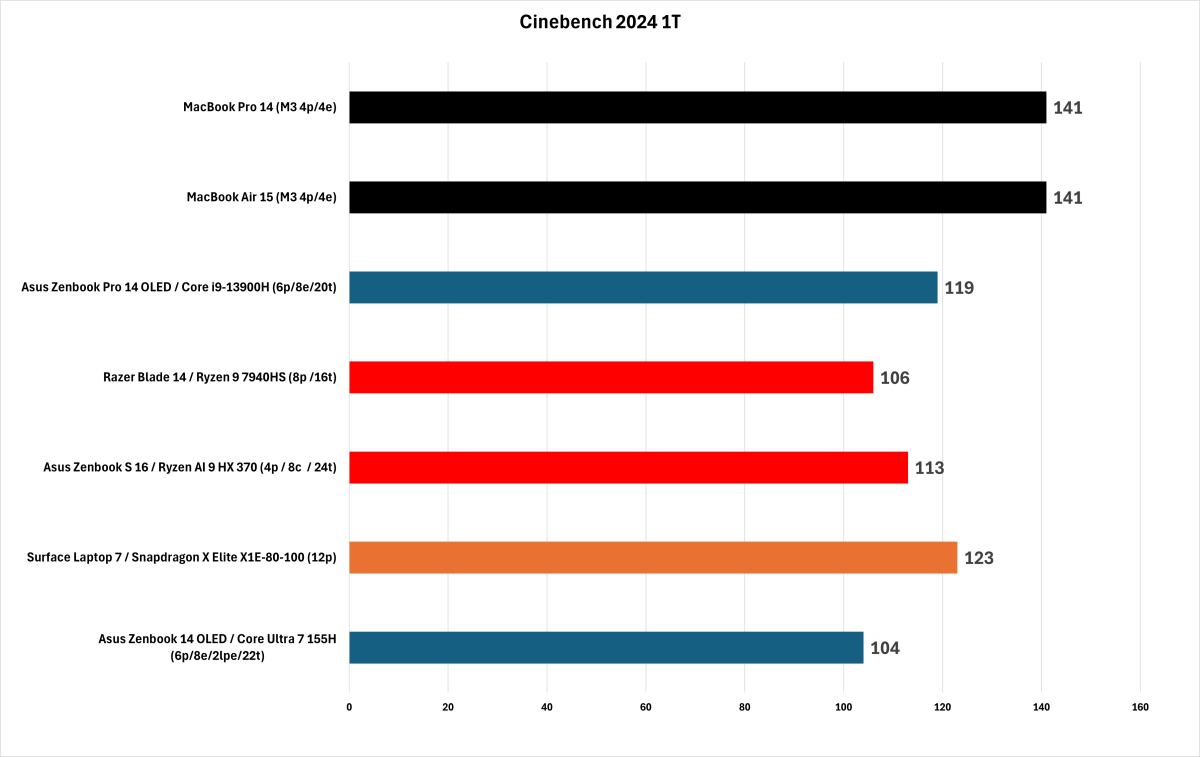
Single-threaded performance still goes to Qualcomm’s Snapdragon X Elite on Windows but Zen 5 offers a decent improvement over Zen 4.
Gordon Mah Ung
Ryzen AI 9 HX 370 doesn’t adjudicate itself as well against the competition as it does in multi-core performance but there’s a couple of key points to pay attention to. The first is the performance against the Zen 4-based “Phoenix” Ryzen 9 7940HS. Single-threaded improvements are difficult but there’s a decent uptick against the older Zen 4-chip.
The other is its slight lead again the Core Ultra 7 155H. And yes, I didn’t have a Core Ultra 9 185H to test, but I’ll again cite Notebookcheck.com which records a score of 109 for its two samples.
Finally, Qualcomm’s Snapdragon X Elite and Apple’s M3 — both based on Arm’s architecture — record very impressive scores in Cinebench 2024, which also can’t be downplayed either. Well done Qualcomm and Apple. (My Apple M3 results were recorded by our sister publication, Macworld, in its reviews.)
Cinebench 2024 single-threaded performance isn’t the end-all in real-world performance though and arguably it isn’t even real-world at all since few people would ever render a 3D model using a single-core.
For a better feel of lightly-threaded performance I ran UL’s Procyon Office 365, which uses Microsoft Word, Excel, PowerPoint, and Outlook to measure performance doing everyday tasks in Office. Most of what you do in Office is fairly “lightweight” and doesn’t use all of the cores the chips have.
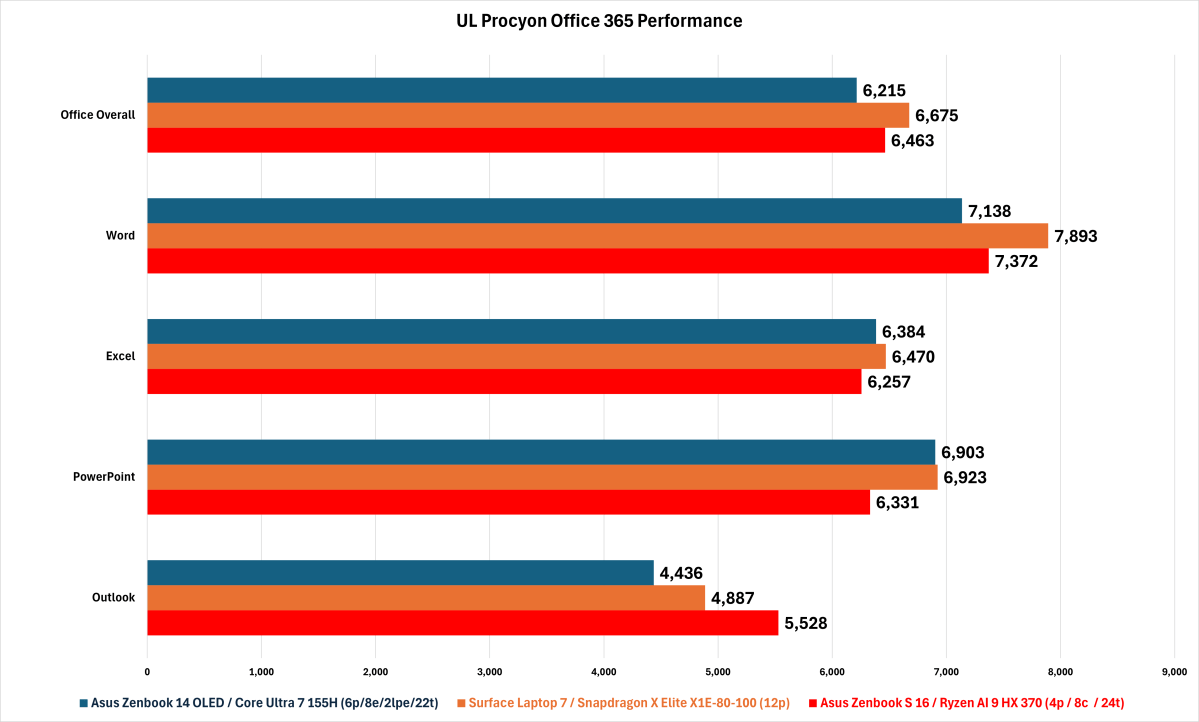
Office 365 performance goes to Snapdragon X Elite with Ryzen AI 300 in 2nd place.
Gordon Mah Ung
The winner overall is Snapdragon X Elite with Ryzen AI 9 HX 370 coming in second and Core Ultra 7 155H in last place. If you dive into the subscores, you’ll see it’s not so cut and dried though. Core Ultra 7 155H performs quite well in PowerPoint and Excel while the Snapdragon X Elite has a big lead in Word. Ryzen, meanwhile, has a big lead in Outlook performance.
Frankly, you can’t lose with any of the chips in Office 365 and most would be hard pressed to feel the difference between them.
AMD Ryzen AI 9 HX 370 AI performance
AI is the moment’s buzzword and likely an important path in consumer computing. Unfortunately it’s a nascent category that has most consumers still scratching their head as why they should even care.
So to look at a more practical use, I used Topaz Lab’s Gigapixel AI, which uses AI models to increase the resolution of digital images. The first result uses the CPU cores to perform the upsample on five 8.2 megapixel images shot with a Canon 1DMk IIn.
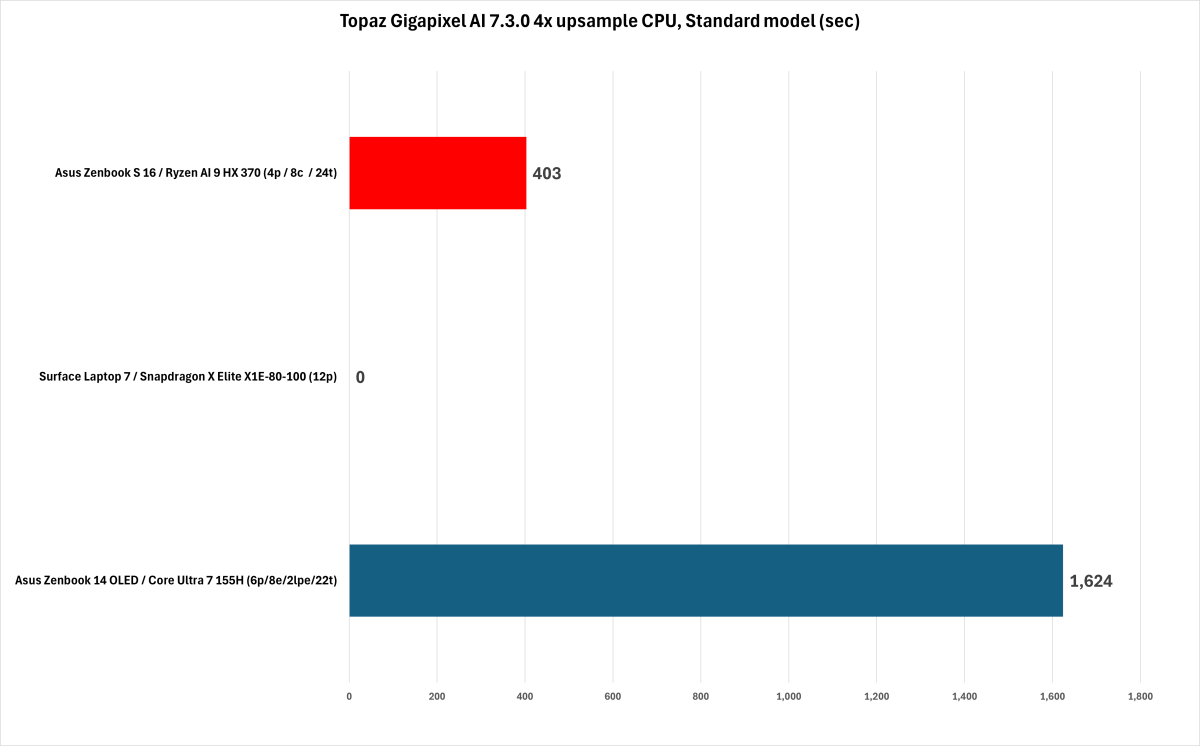
Topaz GIgapixel AI Performance running on the CPU is a big win for Ryzen AI 300 over Core Ultra. And yeah, it doesn’t run on Snapdragon X Elite at all.
Gordon Mah Ung
The big, big winner? AMD’s Ryzen AI 9 HX 370 which simply crushes the Core Ultra 7 155H. It’s not clear to me why the Core Ultra 7 155H does so poorly here especially when you consider that Intel was an early proponent of Topaz Lab’s for gauging “AI” performance, but it’s not a good look.
It’s probably a better look than the result from Snapdragon X Elite though. That big fat zero? It’s because Gigapixel AI requires AVX and AVX2 to install and run, which the Snapdragon X Elite chips lack. As well as the Qualcomm chips perform, it’s just another reason consumers may want to opt for traditional Intel or AMD x86 chip instead — some hardcore applications simply might not work on Arm-based chips.
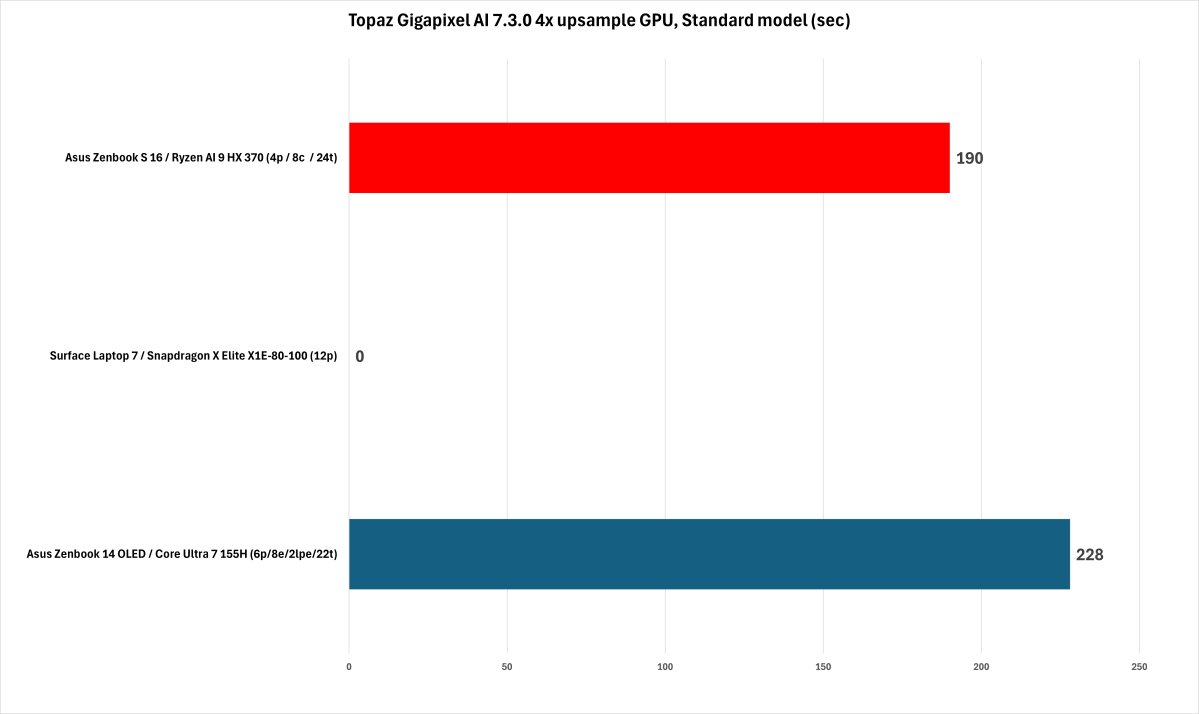
Running Topaz Gigapixel AI on the GPU, the win still goes to AMD’s Radeon 890M, but Intel’s Arc adjudicates itself much better than the Core Ultra CPU cores.
Gordon Mah Ung
Running AI on the CPU cores isn’t the only option though, so I also ran it on the AMD Radeon 890M and Intel Arc integrated graphics as well and we see a significant improvement in performance on both. AMD’s Ryzen AI 9 HX 370 still wins, but Intel’s Core Ultra 7 155H is at least competitive here.
AMD Ryzen AI 9 HX 370 gaming performance
Gaming on thin-and-light laptops with integrated graphics instead of discrete graphics isn’t something that’s generally recommended, but the line between integrated graphics and discrete graphics is becoming increasingly blurry today.
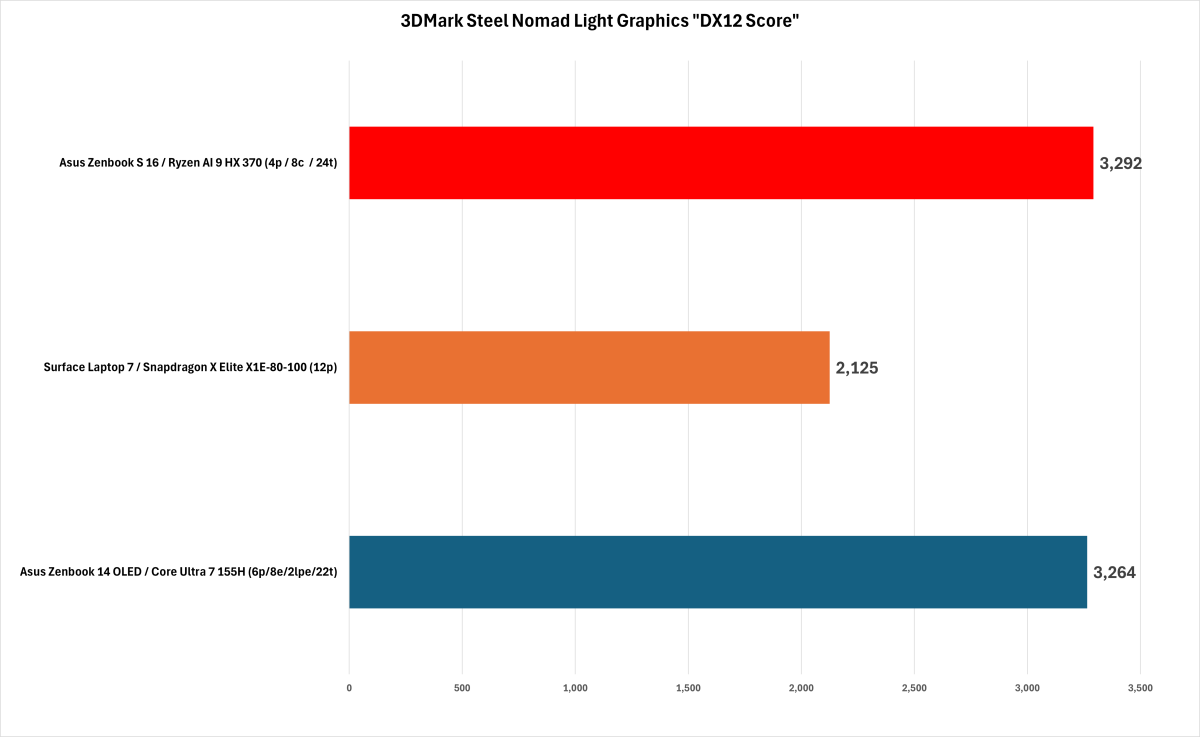
3DMark Steel Nomad Light performance places both AMD Radeon 890M and Intel Arc dead even with both well ahead of Qualcomm’s Adreno.
Gordon Mah Ung
Much of the credit goes to AMD, which has lead the way in integrated graphics for years, and the new Radeon 890M doesn’t disappoint. The first result you can see here is UL 3DMark’s new Steel Nomad Light which actually puts the Radeon 890M dead even with Intel’s Arc graphics.
Synthetic benchmarks designed to measure pure GPU performance doesn’t always match up with actual gaming though so I also run a few games. First up is Cyberpunk 2077, which solidly puts the Ryzen AI 9 HX 370 in front of both the Core Ultra 7 and Snapdragon X Elite with its Adreno graphics.
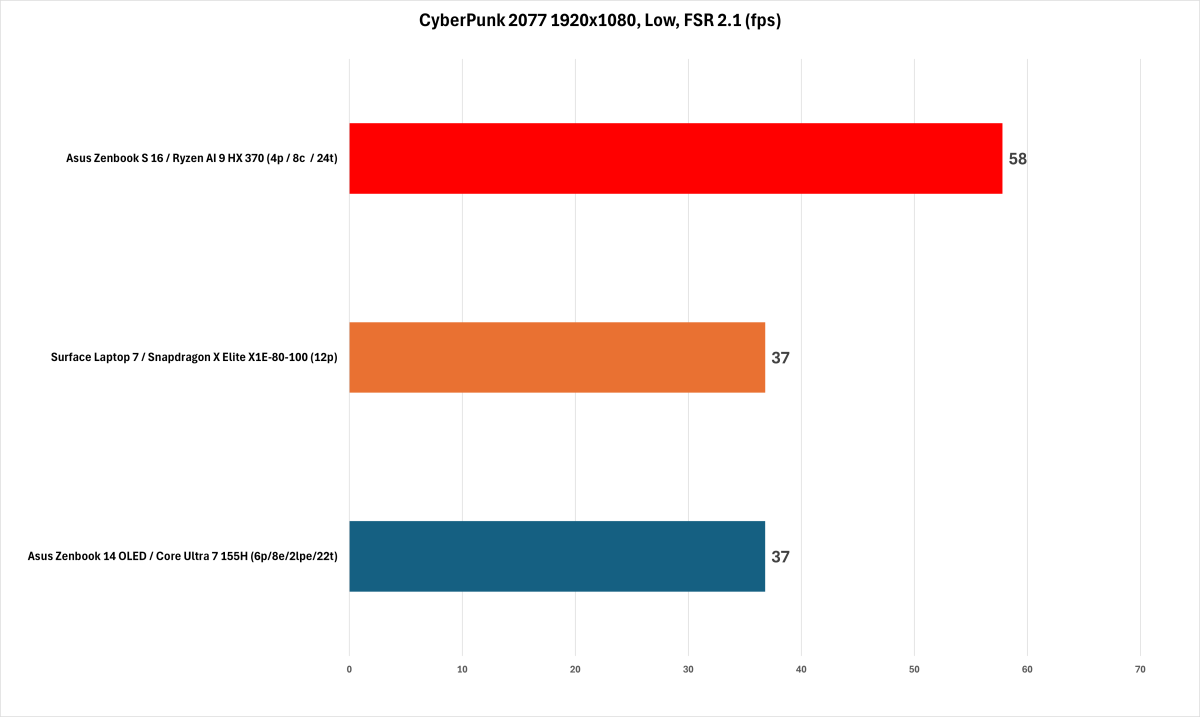
Cyberpunk 2077 is a solid win for the Ryzen AI 9 HX 370’s Radeon 890M.
Gordon Mah Ung
AMD Radeon 890M also leads the way in Shadow of the Tomb Raider with Intel Arc also providing a solid, but definite second-place finish.
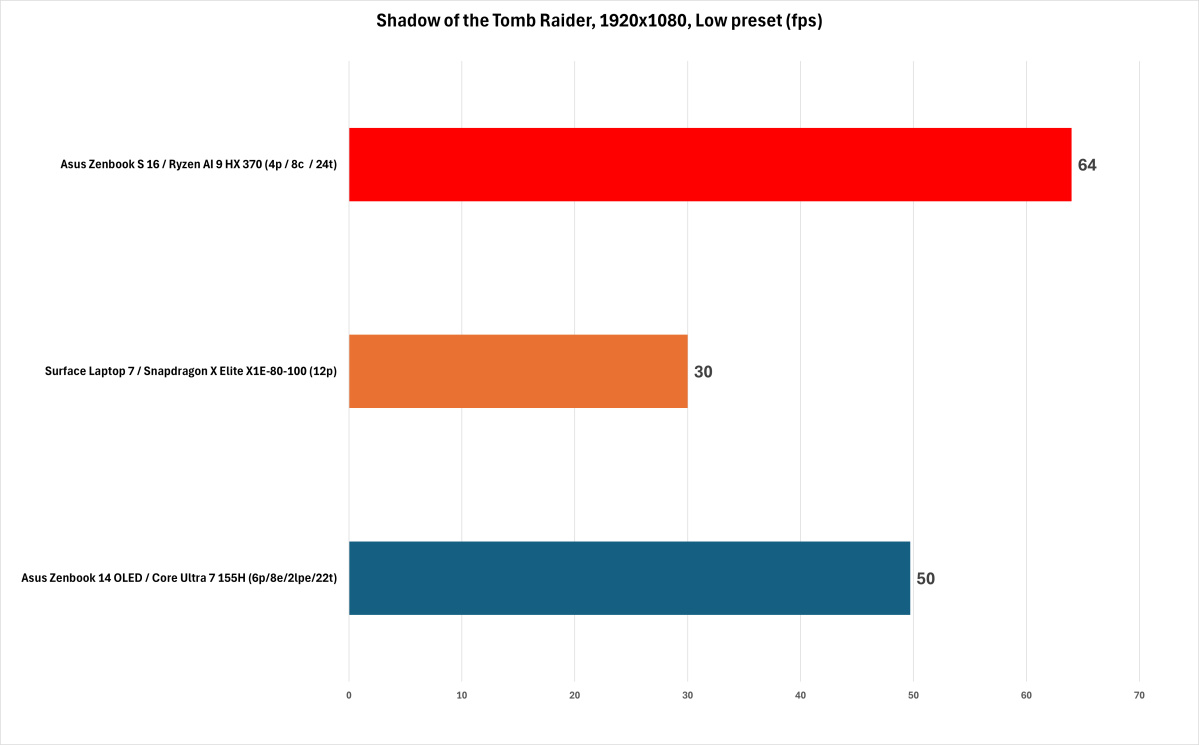
Shadow of the Tomb Raider also puts Radeon 890M in a solid first place.
Gordon Mah Ung
Qualcomm’s Adreno is a distant third place and there’s likely plenty of reasons for it. First, the game is running through Windows 11’s Prism emulation layer, which lets software designed for x86 chips run on Arm-based hardware, but saps performance. Second, Adreno just doesn’t seem to have the raw graphics grunt to run with Radeon and Arc.
This just backs up what we’ve said: Gaming on Snapdragon X Elite isn’t recommended today.
Further reading: Tested: Don’t buy a Snapdragon X Elite laptop for PC gaming
AMD Ryzen AI 9 HX 370 battery performance
The last category is perhaps one of the most important in a laptop and that’s battery life. There dozens of way to measure laptop battery life but for this evaluation, we used UL Procyon’s Office Battery test, which I feel is a pretty real-world methodology.
It uses Microsoft Word, Excel, PowerPoint and Excel to simulate real-world use until the battery dies.
Laptop battery life depends on many factors such as the CPU, but another very important factor is the size of the battery. The larger the battery, the longer battery life in general.
The other factor is the screen technology. In this test, the Qualcomm laptop uses IPS technology, which doesn’t care that much about the color of the screen background. The AMD and Intel both use OLED panels which consume more or less power depending on the background.
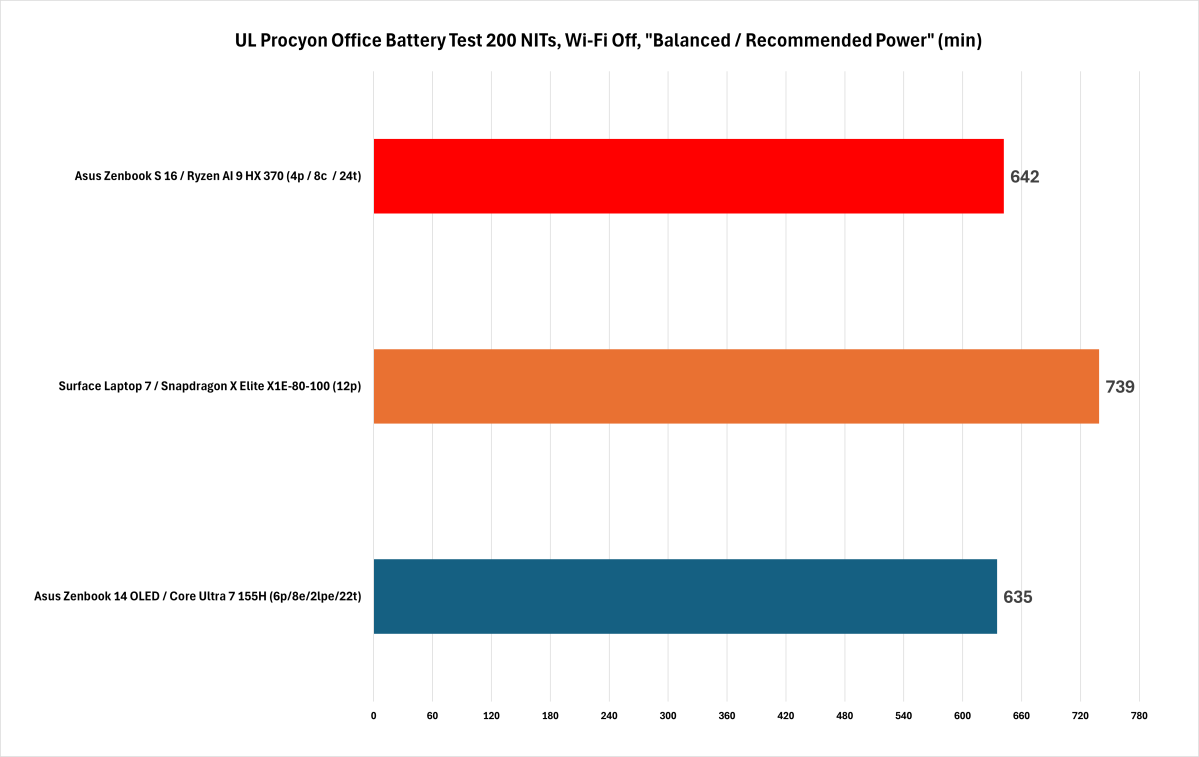
The Snapdragon X Elite is still in the solid pole position in battery life and also more impressive when you consider its smaller battery size.
Gordon Mah Ung
With that said, the clear winner here is the Qualcomm Snapdragon X Elite laptop which gives us just over 12-hours of run time.
When you consider that the Surface Laptop 7 has a 54-watt hour battery versus the 78-watt hour battery in the AMD-based Zenbook S 16 and the 75-watt hour battery of the Intel-based Zenbook 14 OLED it’s even more impressive.
But remember what I said about OLED panels and background color? Well, the Office Procyon battery test uses a standard white background throughout most of its test, which consumes more power.
That makes the results a little mushier but overall, we’d still give the nod to Snapdragon X Elite for battery life. AMD hasn’t been beating its chest quite as hard about battery life except to say its competitive though and for the most part we’d agree.
It’s basically dead even with the Intel-based laptop and both provide in excess of 10-hours in general Office use which is still quite good. The winner though still goes to the Snapdragon X Elite.
Look for reviews of laptops running Ryzen AI 300 chips to start appearing on PCWorld in the very near future, but as this testing shows, AMD’s chip brings some serious performance chops to this new generation of thin, long-lasting, AI-infused Copilot+ laptops.
Further reading: The best laptops we’ve tested









